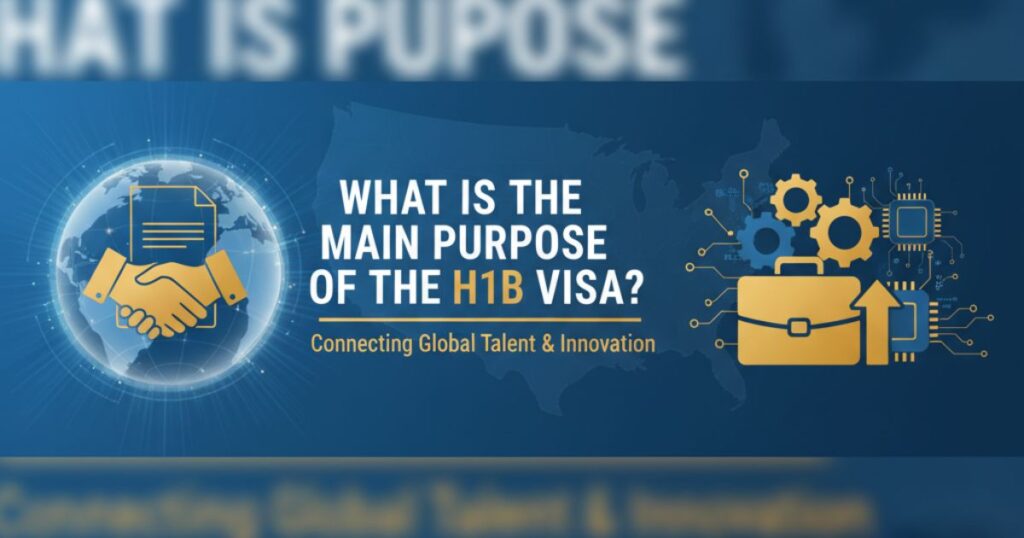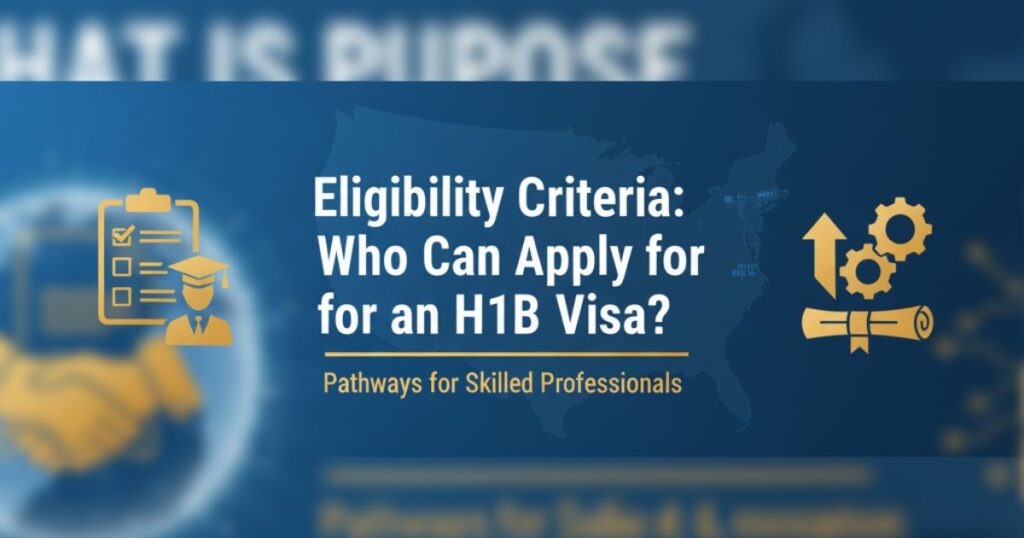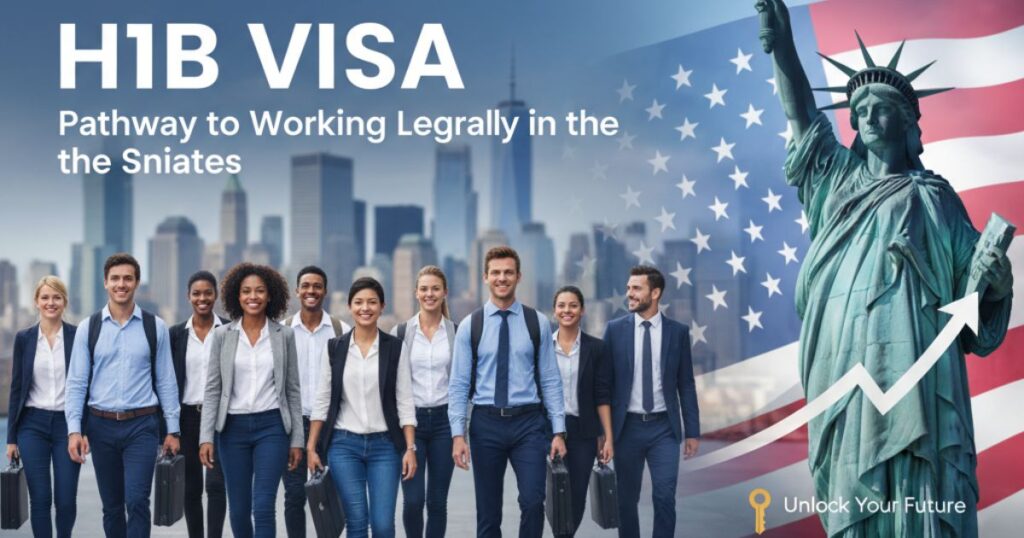Imagine you’ve got a job offer in the United States, but you’re from another country. How do you legally work there? That’s where the H1B Visa comes in. The H1B Visa is a special work permit that lets people with certain skills come to the U.S. and work for a U.S. employer. It’s kind of like a golden ticket if you want to work in the U.S. but aren’t an American citizen or permanent resident. In simple terms, this visa is for people with special jobs that need specific skills or education, usually a college degree or higher.
What Is the Main Purpose of the H1B Visa?

The H1B Visa exists to help U.S. companies bring in highly skilled workers from other countries to fill jobs that might need special knowledge or training. Think jobs like engineers, computer programmers, doctors, or scientists. The goal is to let companies get talented professionals to boost innovation and growth—while making sure they follow rules that protect American workers. So, the H1B Visa is a way to legally work in the U.S. if you have unique skills.
Eligibility Criteria: Who Can Apply for an H1B Visa?

To get this visa, you need to meet certain rules. First, you must have a job offer from a U.S. employer who’s willing to sponsor you. Your job should be what’s called a “specialty occupation,” meaning it requires specific skills or at least a bachelor’s degree. Also, you need the right education or experience to fit the job’s needs. For example, if you’re applying for a software developer role, having a degree in computer science or relevant experience helps. Both you and your employer must meet these requirements before applying.
Step-by-Step H1B Visa Application Process
Applying for an H1B Visa might seem tricky, but let’s break it down in five simple steps:
- Find a Sponsor: You have to get a job offer, and your employer agrees to sponsor you.
- Labor Condition Application (LCA): Your employer files an LCA with the U.S. Department of Labor. This shows they’ll pay you fairly and protect U.S. workers’ rights.
- Submit Petition: The employer sends Form I-129 (petition) to the U.S. Citizenship and Immigration Services (USCIS).
- Wait for Lottery Results: Because there are limited visas each year, USCIS runs a lottery if applications exceed the cap.
- Get Visa and Travel: If approved, you get your H1B visa stamp and can travel to the U.S. to start your new job.
What Are the Recent Changes in the H1B Lottery System?
The H1B lottery is like a lucky draw. Since only 85,000 H1B visas are available each year, USCIS has a random lottery to pick which petitions get processed. Recent changes include prioritizing applicants with higher degrees (like master’s or PhDs) and making the process more digital and transparent. This means your chances increase if you have an advanced degree. But remember, the lottery can feel unpredictable, so always have a backup plan!
Understanding the Role of Labor Condition Application (LCA)
The LCA is a promise your employer makes. It says they’ll pay you a salary that’s at least equal to what other workers earn doing the same job in the area. The idea is to keep things fair and stop companies from underpaying foreign workers. This step protects both you and local workers, making sure no one gets a raw deal. Your employer has to submit the LCA before filing your visa petition, so it’s a key part of the process.
Duration, Extensions, and Dual Intent Explained
An H1B Visa usually lasts for three years but can be extended up to six years. Sometimes, when you’re aiming to stay longer, you might apply for permanent residency (green card). Here’s where “dual intent” is important—it means you can apply for a green card while still on your H1B visa without worrying about losing your current status. So, the visa is flexible, offering a path to long-term stay if you want it.
Portability: How to Change Employers on an H1B Visa
Did you know the H1B visa can move with you? If you want to switch employers, your new employer has to file a petition on your behalf. You can start working as soon as USCIS gets this petition, even before it’s approved. This “portability” lets you explore better jobs without losing your visa status. Just remember, your new employer must also meet all the requirements and submit the right paperwork.
Common Reasons for H1B Visa Denial and How to Avoid Them
Visa denials happen, but many can be avoided. Common reasons include incomplete applications, missing documents, failing to prove the job qualifies as a specialty occupation, or wage concerns. To dodge these pitfalls, double-check your forms, gather all necessary proof, and work closely with your employer or an immigration lawyer to ensure everything is clear and accurate. Being thorough can save a lot of headaches.
H1B Visa vs Other Work Visa Types: A Comparative Analysis
There are several work visas out there, but the H1B stands out for specialty occupations. Compared to an L1 visa (for internal company transfers) or an O visa (for extraordinary ability workers), the H1B is more common for new hires needing specific skills. It also allows dual intent and longer stays than some others. Knowing which visa fits your situation is key to making the right move.
Financial Requirements and Salary Obligations Under H1B
U.S. law requires employers to pay the “prevailing wage” for your job. This ensures you’re paid fairly based on your role and location. Your employer must prove they meet these wage rules through the LCA process. This protects you from low offers and ensures your salary matches industry standards. Plus, it helps maintain fairness in the job market.
The Impact of H1B Visa on US Labor Market and Economy
The H1B visa plays an important role in the U.S. economy by filling skill gaps and supporting innovation. Many tech companies, universities, and healthcare providers rely on H1B workers. These professionals bring new ideas, boost productivity, and create jobs. However, it also sparks debates about protecting U.S. workers and balancing foreign talent. Understanding this impact helps you see the bigger picture beyond just the visa process.
Read More:The Visa Strategy Most Professional Miss: O1A vs H1B truth
Alternative Visa Options and When to Consider Them
If an H1B visa isn’t an option, there are alternatives. For example, the L1 visa for intra-company transfers, the O1 visa for people with extraordinary skills, or the TN visa under NAFTA for Canadians and Mexicans. Some also explore green card options or student visas with work permissions. Exploring alternatives ensures you have a backup plan tailored to your career goals.
How to Prepare for H1B Visa Interview Successfully
Interviews can be nerve-wracking, but preparation helps. Understand your job role and visa details well, dress professionally, bring all required documents, and be honest. Practice common questions like why you want the job or how your skills fit. Confidence and clarity go a long way to impress the consular officer. Remember, it’s your chance to show you’re ready and qualified.
FAQs
What is the H1B Visa and how does it help you work legally in the United States?
The H1B visa is a US work authorization that allows skilled professionals to work legally in specialty occupations for American employers.
Who is eligible for the H1B Visa under current USCIS rules?
Eligibility requires a bachelor’s degree or equivalent, specialized skills, and an employer willing to file a petition.
How does the H1B Visa lottery system work for new applicants?
USCIS randomly selects registrations when applications exceed the annual cap, choosing who can proceed with filing.
What documents are required when applying for the H1B Visa through employer sponsorship?
You need educational proof, job offer letters, labor condition approvals, and employer-filed petitions.
How long does the H1B Visa process take from registration to approval?
The process typically takes several months, depending on lottery results, employer filing speed, and USCIS processing times.
Conclusion
The H1B Visa: Pathway to Working Legally in the United States remains a powerful opportunity for skilled professionals aiming to build a stable, long-term career in America. With the right guidance, strong employer support, and a clear understanding of USCIS rules, your journey becomes smoother and less stressful. Whether you’re exploring new job opportunities, planning a future move, or simply trying to understand the immigration process, taking informed steps can open doors to a successful life in the United States


